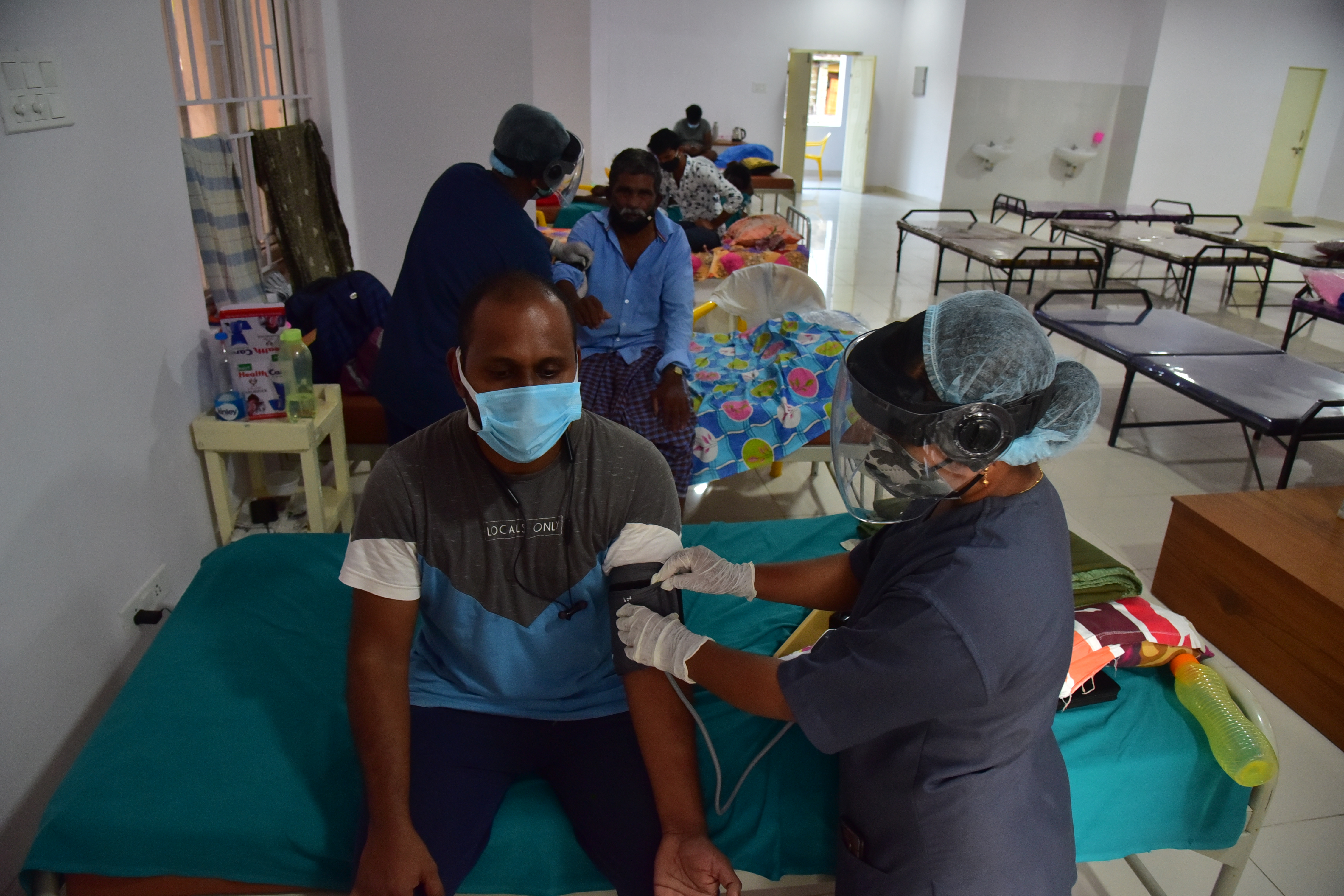
V Rajagopal
THE Makineni Basavapunnaiah Vignana Kendram (MBVK) and its sister centres across the state, in a move to bring solace to the needy during the Covid-19 second wave, have opened Covid isolation centres across the state.
The second wave of Covid has created havoc throughout the state and it has become difficult to secure hospital beds. In this situation, the MBVK has taken upon itself to instill confidence among the people with mild or moderate Covid, especially to cater to those who cannot afford separate isolation rooms and bathrooms in their houses.
The experience gained by the MBVK trust in setting up of Covid isolation centres during the first wave has come handy. The isolation centre at Balotsav Bhavan in Vijayawada, which was started during the first wave, was reopened with 30 beds owing to the high number of positives. However, with these beds also becoming insufficient, the MBVK trust started another isolation centre at the Sundaraiah Skill Development Centre at Tadepalli, the capital region, with 80 beds.
Isolation centres have also been started in Anantapur, Visakhapatnam, Srikakulam, Nellore, Kurnool, Guntur, Palnadu, Araku etc., with bed strength varying from 10 to 80 depending on the availability of health infrastructure. Helplines rendering telemedicine services were started at Ongole, Eluru and other places.
A common system and protocol is being observed in all these centres with minor modifications suitable to the local needs. A team of two to six doctors have been rendering their services to the patients in each centre. Round-the-clock nursing service has been made available. The nurses have been working in shifts and most of them have been lodged in the same premises or at a nearby place. Nurses, who play a key role in rendering the treatment, monitor the oxygen saturation levels, body temperature, pulse rate and BP of the patients periodically and when needed. A standard menu has also been followed for all the patients to help in their speedy recovery. A team of dedicated volunteers serve the food and cater to any other needs of the patients. All the activity at the centres is being looked after by the team of Party leaders of the centres.
A strict schedule is being adhered to in the isolation centers. The day begins at 6 am with a general health check up for the patients at 6 am. This is followed by breakfast at 8 am and Ragi or millet soup is served at 11 am. Healthy lunch and snacks are served at 12.30 pm and 4 pm. This is followed by a session of yoga or mild exercises to keep the morale of the patients high and another health check up is done at 8 pm. Dinner with an egg is served at 8.30 and by 10 pm, the patients are advised to sleep. A team of doctors check the patients’ reports at least twice a day and advise the nurses accordingly. If necessary, the patients are shifted to hospital. The doctors coordinate among themselves and also seek other experts’ opinions in some cases. Almost all the centres are equipped with oxygen cylinders/concentrators for emergency use.
People from different walks of life joined the centres and have recovered. Daily wagers, software professionals, students, journalists etc., have availed the services. People have visited the centres and appreciated the organisers for their service and offered financial and material support to run the centres. The state leaders of Left parties visited the isolation centre at MBVK and appreciated the efforts of MBVK trust and the CPI(M) state committee.
The Hindu published a special news item regarding Anantapur centre named after renowned writer late Singamaneni Narayana. The article said, “With almost no ICU bed or oxygen-supported bed available in Anantapur district except for a few Covid Care Centre beds in the JNTU hostels, the Viswam Vignana Kendram in association with the United Teachers’ Federation and Kodigenahalli 1989 Alumni Association, on May 1, invested about Rs 2 lakh to set up a Covid Care Centre by taking proper permissions from the district administration.”
“Our idea has been to support friends infected by Covid-19 by providing them a safe place to spend 14 days away from their family so that others do not get infected,” Communist Party of India (Marxist) district secretary V Rambhupal tells The Hindu. On May 14, out of 42 patients 13 got discharged. Many Telugu dailies carried news items in the tabloids regarding different centres and the services rendered there and exclusively about the confidence they instill.
In Visakhapatnam, the Alluri Seetarama Raju Memorial Trust started an isolation centre in the premises of NPR Bhavan, the CITU district committee office. Sarada Trust started an isolation centre in the remote tribal area of Araku in their school premises. In Srikakulam, the AP United Teachers’ Federation district committee office rooms have been converted to an isolation centre and teachers donated money and material including Oxygen cylinders for the centre. Jashua Vignana Kendram started a centre with 25 beds in the premises of CPI(M) Guntur district committee office and expanded it further with ten more beds. In Piduguralla of Guntur district. Putumbaka Venkatapati Memorial Centre started an isolation centre with 30 beds. They are trying to expand it further to cater to the local needs.
Dr Jetti Sesha Reddy Vignana Kendram started a centre within its premises on the May Day. Dr Ramachandra Reddy Peoples’ Polyclinic doctors have been rendering medical aid and volunteers from mass organisations provide other support. In Kurnool, Sundaraiah Sphoorti Kendram started an isolation centre. A team of women from Indira Nagar cook nutritious food for the patients here. Some more centres have also been started at Tirupati, Bhimavaram, Akiveedu etc.
These isolation centers, even though few in number, have shown the way to serve the people in these dire conditions. The treatment instilled confidence among the patients, and the doctors, nurses and volunteers have expressed extreme satisfaction with their service. The Vignana kendras and various mass organisations are in the forefront in this activity.


